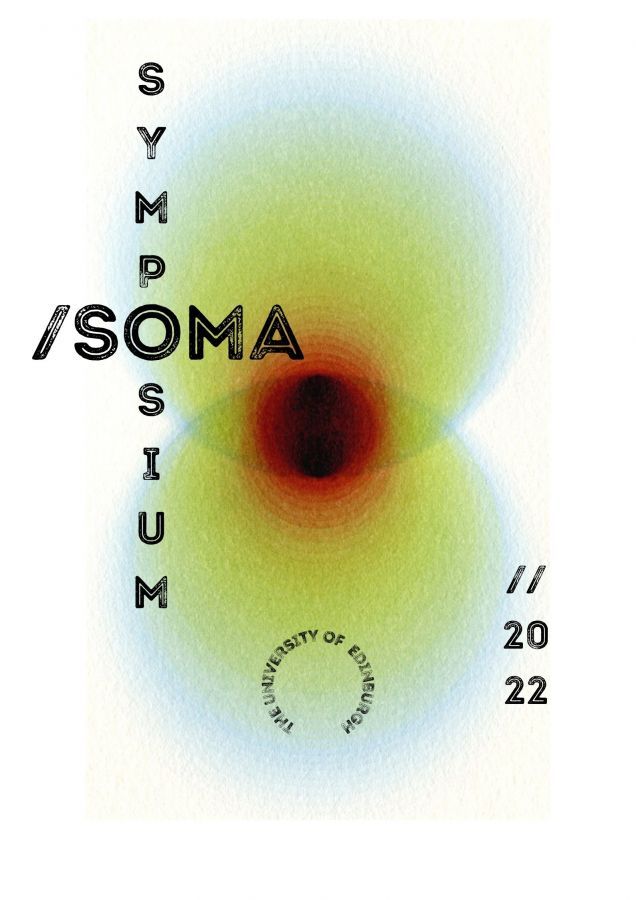Annual SoMA Symposium 2022
Media
Image

Blog content
On May 26, 2022, the Students of Medical Anthropology (SoMA), a student-led group within EdCMA, held their Annual Symposium in a hybrid fashion, enabling people to participate online and in-person. The Symposium was entitled “Making Sense of Communities” and was divided into two sessions: enacting and navigating care amongst patient communities and addressing how morals and our understandings of health and disease need to be viewed with a critical lens. Postgraduate students from the University of Edinburgh and University of Glasgow responded to our call for papers that invited participants to interrogate the makings, meanings, and significance of both human and more-than-human communities. The day was filled with robust discussion on personal research endeavours, exchanges of reading suggestions, and helpful feedback on works-in-progress.
Session 1: Enacting/Navigating Care
- Natalie Moffat: “Conceptualising menstrual care within entangled, more-than-human communities”
- Michelle Potiaumpai: “Endometriosis Patients, Knowledge and the Role of Community”
- Wren Wilson: “It’s been a journey: Navigating, Narrating and Mapping Spheres of Care for People Living with HIV in Scotland”
Session 2: Morality and Change (in a Shifting World)
- Laila Rajani: "The Progress Paradox: Exploring the Nexus between Development, Social Inequalities, and Mental Distress in Northern Pakistan"
- Armaan Alkazi: "Syndemics Amongst Homeless Populations in Delhi"
- Patricia Mundelius: “Negotiating Morality in the Context of Globalization: The Case of Tibetan Medicine in Kathmandu, Nepal”
Discussion sessions were held after each presentation session, which provided an opportunity to explore questions foremost on our colleagues’ minds. Topics of discussion included dissemination of research; how it is difficult to have an impact agenda as a PhD student, and how embarking on a project in a researcher’s home region can have impacts on a project’s trajectory and focus, while acknowledging that being an outsider in a research community can be beneficial and offer opportunities to bridge gaps. One participant brought up a salient point that people interrogate the thought that if communities emerge from systemic failures of the system, what do we imagine they would look like if we did things better? The Symposium illuminated the diversity of research being undertaken and the push to think critically about how we affect the communities we are in and how they affect us in turn.


The second part of the Annual Symposium was a sensory ethnographic writing workshop which took place during the second half of the day. With lively music playing throughout the afternoon, participants engaged in exercises and discussions relating to the senses. Students reflected on what they think makes ethnographic writing interesting and explored how harnessing the power of senses and their impressions can elevate and invigorate writing. They practiced free-writing techniques that saw them describing a sensory rich fieldwork scene, discussed the value of feedback from their communities, and evaluated sensory ethnographic writing examples to explore different writing styles and processes. The workshop capped the end of an exciting day in which students had been able to partake in in-person discussions, which is still a novelty as we all continue to navigate the ongoing COVID-19 situation.

Abstracts of the Presentations
Natalie Moffat, University of Glasgow
Conceptualising menstrual care within entangled, more-than-human communities
In this paper, menstrual blood and reusable menstrual products are simultaneously topics of study, research participants, and (auto)ethnographic methods for conceptualising, expressing, and enacting entangled, more-than-human communities. I draw upon my ongoing doctoral research which seeks to complicate the apparent theoretical/empirical binary by engaging with multiple, intersecting ways of knowing menstrual care and the wider worlds it exists within. These are – primarily – posthuman feminist theorising, lived experience, and menstrual art practice. Menstruation and menstrual products are conceptualised as ‘encounters-in-motion’ (Tsing, 2015) – as multiple, agentic, and intra-actively produced through ongoing material-discursive practices which determine what ‘matters’ in both senses of the word and therefore the realm of possibilities and impossibilities (Barad, 2007). The practices through which menstrual care (and other bodily happenings) are constituted occur within and participate in constituting entangled, more-than-human communities which span ‘layers of locals and globals’ (Haraway, 2003). I suggest that these phenomena are simultaneously material, social, affective, ethical, and political.
I will explore these ‘ideas-in-progress’, firstly, by discussing an event which was pivotal in developing them – my experience of menstruating when wearing a reusable menstrual product at the Kenmure Street protest in Glasgow’s southside in May 2021. Here, ‘relations of obligation’ (Barad, 2007) within a neighbourhood manifested as more-than-human embodied resistance and the emergence of more just realities. I will then present menstrual art depicting the event and consider the process of creating menstrual art, its enablers (and constraints) within my household, and how this matters for conceptualising and enacting menstrual care in/as entangled, more-than-human communities.
Michelle Potiaumpai, University of Edinburgh
Endometriosis Patients, Knowledge and the Role of Community
Endometriosis affects 1 in 10 women of reproductive age with many symptoms characterized by chronic pain. It is often categorized as an invisible condition which can lead to social and medical discreditation. The objective of this project was to explore how women with endometriosis experience, make sense of, and deal with their pain. The study consisted of a qualitative design utilizing thematic analysis to uncover the various ways in which women’s lives are impacted by their pain. These were: pain as a “constant companion”, effect of normalisation of pain in seeking medical care, struggle on the journey to diagnosis, and reasoning after diagnosis. Participants conveyed that living with endometriosis pain was not only a battle to perform daily activities, but also a battle to prove their pain to physicians. They felt ignored by the medical community and this made them reluctant to seek further medical care.
This presentation builds on this research data and incorporates the use of experience as a knowledge foundation for establishing credibility. People with endometriosis often use their shared health experiences to advocate for themselves and challenge the authority of biomedicine which often leaves them disappointed. I will examine how patients gained their knowledge, how they put it to use, and how the community factors into their experience of this condition.
Wren Wilson, University of Edinburgh
It’s been a journey: Navigating, Narrating and Mapping Spheres of Care for People Living with HIV in Scotland
Researched and explored exhaustively across the globe for decades, HIV still is a considerable public health factor for many nations. This project seeks to observe and gain a deeper understanding of the experience of navigating care networks (social, psychosocial, biomedical, spiritual) for those living with HIV in contemporary Scotland.
This research builds upon previous qualitative research regarding themes of disclosure in Scotland for PLHIV and it contributes to a deeper understanding of the embodied experience of living with HIV and access to care. Most research portrays HIV health care interactions and disclosures as primarily instrumental or pragmatic rather than expressive or social (Green and Sobo 2000). There has been little purposive inquiry, that explores the narrative, and narrative spatial, experience of care and how it becomes intertwined with biomedical outcomes of the individual and broader public health networks. Equally, what these narratives indicate about medical access, political. decision-making and overall care.
Narrative analysis will be applied but in tandem with additional visual representations of space/experience through ethnographic cartography. Introducing ethnographic cartography will show how networks are incorporated into everyday experiences of care and narratives of place-making (Barassi 2013). These foundational methodologies are particularly important to engage with participants and institutions during an increasingly digitally and visually dependent environment. These methods also more clearly demonstrate the physical experience of reaching medical and social connections for PLHIV in Scotland during the COVID-19 pandemic.
Armaan Alkazi, University of Edinburgh
Laila Rajani, University of Edinburgh
The Progress Paradox: Exploring the Nexus between Development, Social Inequalities, and Mental Distress in Northern Pakistan
Mental health activists and service-users have long argued for research and interventions to take into consideration structural determinants of mental distress such as violence and inequality. Yet, current scholarship on high rates of mental distress amongst women in Pakistan focus on proximal social determinants (factors pertaining to individuals and families).
This project challenges public health investigations that places responsibility of poor mental health of women in the region on family conflict, thereby misplacing causal accountability and missing the opportunity for large-scale transformation and social change. Taking poor mental health amongst women in northern Pakistan as a case study, this project examines how structural determinants such as gender inequality, poverty, and impact of development interventions, shape women’s mental health in northern Pakistan.
Patricia Mundelius, University of Edinburgh
Negotiating Morality in the Context of Globalization: The Case of Tibetan Medicine in Kathmandu, Nepal
The Tibetan medical practice, one of the oldest medical systems still practiced, has long been shaped by a strong ethical commitment based on its foundational texts that are – indeed – essential for the moral community of Tibetan medical practitioners. However, over the past decades Tibetan medicine has been subject to unprecedented changes that contribute to its reinvention as a modern practice and its establishment in global markets. And as practitioners try to expand their activities on a global scale, they are increasingly confronted with different values and moral ideals, a process that challenges existing moralities and partially urges for sincere reflections on moral boundaries and (re-)interpretations of morality.
With these considerations in mind, this paper connects to the general questions of how a local morality and its moral community are, on the one hand, transformed in exchange with global values, and to what extent moral standards themselves, on the other hand, shape the globalization of practices and identities and thereby confine or encourage visions of globalized culture. In answering these questions, the focus is on the doctors of Tibetan medicine in Kathmandu, Nepal, their interpretations, and negotiations as well as discourses on morality. First, I observe how the Tibetan medical code of ethics is negotiated or interpreted individually and collectively in a globalized context of practice. And second, I illustrate to what extent this moral assemblage enables but also constrains visions and implementations of globalized medical practices and identities, creating a ‘sense for the (im-)possible’ within the community.
Thank you to:
Workshop Organising Team: Gabriele Zukauskaite, Patricia Mundelius and Michelle Potiaumpai
Symposium Organising Team: Gabriele Zukauskaite, Laila Rajani, Patricia Mundelius, Michelle Potiaumpai, Martin Yang, Aphaluck Bhatiasevi, Armaan Alkazi, Iona Walker, and Ritti Soncco
